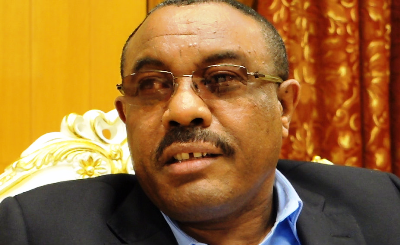Ethiopia reshuffles cabinet after waves of protests
By Tesfa-Alem Tekle
November 01, 2016 (ADDIS ABABA) – The Ethiopian Prime Minister, Hailemariam Desalegn has reshuffled his cabinet, appointing 21 new members.

The Ethiopia’s parliament has unanimously approved 21 ministers proposed by Desalegn.
The new ministers, the prime minister said, were picked for competence and commitment, not based on “party loyalty.”
Tuesday’s appointment brought in five technocrats and nine newly appointed ministers from Oromia, the region where deadly protests have been taking place.
The appointees include a new minister of foreign affairs, Workneh Gebeyehu, who replaces Tedros Adhanom, currently vying for World Health Organization’s top post.
The communications minister, Getachew Reda was replaced by Negeri Lencho, the head of the journalism and communications college at Addis Ababa University.
Only nine of the 30 previous cabinet including defense minister, Siraj Fegessa, and prime minister’s deputy, Demeke Mekonnen have retained their ministerial posts.
Sudan Tribune understands the new appointees make up 70 % of the cabinet and the technocrats make up around 43%.
Some of the Addis Ababa residents interviewed on Tuesday welcomed the prime minister’s move, saying it was a step forward in addressing the grievances of the people.
They believe the reshuffle would ease the tensions between opposition protesters and the government. They called on government to open dialogue with opposition protesters to find a durable solution.
Kebede chamo, an oromo opposition official, says the premier’s move is not enough.
Kebede says all the new appointees apart from the five technocrats are all affiliated to the ruling party.
“These little changes on political space won’t satisfy the opposition considering what is being demanded” he said
He added “There is no any opposition representative in the parliament. What we need is a real election”
In 2015, the Ethiopian ruling party won every seat in the country’s parliament.
Kebede further says the government must release all opposition members and supporters jailed following the recent protests.
The anti-government protests, initially sparked in protest to government plans to expand the territorial limits of capital Addis Ababa into neighboring Oromo towns and villages.
The Oromos, Ethiopia’s largest ethnic group, feared the Addis Ababa master plan could lead to land grabbing and dislodge millions of them from their ancestral lands.
However Addis Ababa scraped the plans after widespread protests that led to clashes, which killed over 140 people.
Although the master plan was removed, protests however continued at universities and in oromia towns further demanding economic and political rights.
The oromo protests triggered protests in the northern Amhara region that echoed similar demands.
The protests also call for political power hence the ruling party EPRDF party is considered as being dominated by leaders from the Tigrayan ethnic group.
According to Human Rights Watch, the recent clashes between protesters and security forces have claimed the lives of more than 500 people.
However opposition groups say the figure might be much higher.
Officials say the state of emergency was imposed in response to the series of protests in the two sensitive regions.
Directives of the decree among others include authorizing police to arrest individuals without a warrant, blocking internet access, prohibiting public gatherings and imposing curfews.
Diplomats in the country were not permitted to travel beyond 40 kilometres of the radius outside the Ethiopian capital, Addis Ababa.
Hailemariam on Tuesday said travel restrictions on the diplomatic community will be lifted soon hence peace is being restored following the state emergency.
Other imposed bans, he said, will also be lifted seeing improvements the decree brought.
The United Nations had previously urged the Ethiopian government to ensure the protection of fundamental human rights when imposing the measure.
(ST)
